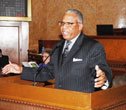Rep. George Flaggs, D-Vicksburg, said he wants the Mississippi Senate to belly up and help the House fund Medicaid.
"If the governor wants to work out Medicaid, he's going to have to compromise." Flaggs said. "He's holding the Senate hostage, and I think everything ought to be on the table in conference, and then we need to work out a long-term solution."
The state health program serves more than 500,000 Mississippians and is in danger of running out of money this year, House members say. The program suffers a shortage between $87 million and $90 million, and is looking at another budget shortfall of about $250 million next year.
The House attempted to grab more cash for the program in the next fiscal year through HB 1013, which would have funded the program through a $1 increase on a pack of cigarettes, but Senate Public Health Committee Chairman Hob Bryan—a Democrat from Amory who has supported a tobacco tax increase in the past—did not bring the bill up for a vote, essentially killing it.
"(Gov. Haley Barbour) will veto a cigarette tax, the votes are not there to override the veto, and I don't think it's productive to have a vote just so the governor could veto it and have his veto sustained," said Bryan, who predicted a friendlier year for the cigarette tax next year, after Barbour has completed his assessment of the state tax system.
Barbour, a former tobacco lobbyist, has vetoed similar tax increases in the past, and wants to keep the state's tax at 18 cents a pack, the lowest in the nation for a state that does not grow tobacco.
This year, however, tobacco tax advocates are framing the measure as an attempt to salvage Medicaid. Barbour favors the program's salvation through reviving a tax on hospitals, though hospital advocates claim many hospitals are already in the red.
Many Democrats predict hospitals will pass along the new tax to patients.
Neither the hospital or tobacco tax would likely keep the program functioning until June 30. Lawmakers will have to address that shortage with a different bill.
Bryan said Barbour's hospital tax proposal had already been in use three years ago, until the federal government rejected the method as noncompliant with guidelines.
The state, since then, has been filling the resulting hole with federal money derived from now-depleted Katrina recovery funds.
"If we're going to continue this optional program, the hospitals need to come up with a way to produce $90 million to replace the state money, or $85 million or $80 million. Nobody I know is hung up that we get every penny, dollar for dollar, but we've got to have that contribution otherwise we'll be taking $90 million from the taxpayers and distributing it to a series of hospitals who no longer have to come up with a match to get the money with in the first place," Bryan said.
Flaggs, who is the author of HB 1013, is gunning for the cigarette tax, however, and took the death of his bill particularly hard.
"I am absolutely tired of coming here every year, year after year, and having to deal with a Medicaid deficit. We need to fix the program and fix it once and for all. If Barbour really wanted to fix Medicaid he could have done it in the blink of an eye," Flaggs said.
House Public Health Committee Chairman Steve Holland complained the Senate acted irresponsibly in moving no further than killing the House plan.
"The Senate made an awful mistake by at least not stripping the bill down and leaving us a framework to work with. I understand if they may not want the cigarette tax, but they have left the most dreaded alternative, and that's the suspension of the rules to get something." Holland said. "Shame on the Senate for letting everything die. It's terribly pretentious and cowardly."
Senate leaders say the Senate has not yet passed a bill pushing the hospital tax because it is waiting for representatives of the hospital association to come up with feasible proposals.
Though largely empathetic to Barbour, the Senate is still divided regarding the cigarette tax. First-term Jackson Sen. David Blount attempted to raise the excise tax on cigarettes with SB 2439 this session, though his bill died in committee last week.
The House is considering passing a concurrent resolution to suspend the rules by extending its March 18 deadline. The resolution must survive both the House and the Senate by a two-thirds vote. The House stands a better chance of passing the resolution than the Senate, which could kill the resolution with only 18 votes, if it even survives the Senate Rules Committee.
Failing that, the House and Senate will have to negotiate Medicaid's funding mechanism, though House members say they will likely stick to their guns on the cigarette tax.
"If we can come to a consensus we can get the paper done," Bryan said. "The difficulty is coming up with a proposal that everyone will agree with."
Some legislators say Barbour will have to call a special session to specifically address the issue, and may even be considering calling a special session during the regular session, though Barbour's spokesman Pete Smith told The Clarion-Ledger that the governor sees no special session on the horizon —a departure for a governor who often calls special sessions to get his prized legislation passed.



Comments
Use the comment form below to begin a discussion about this content.
comments powered by Disqus